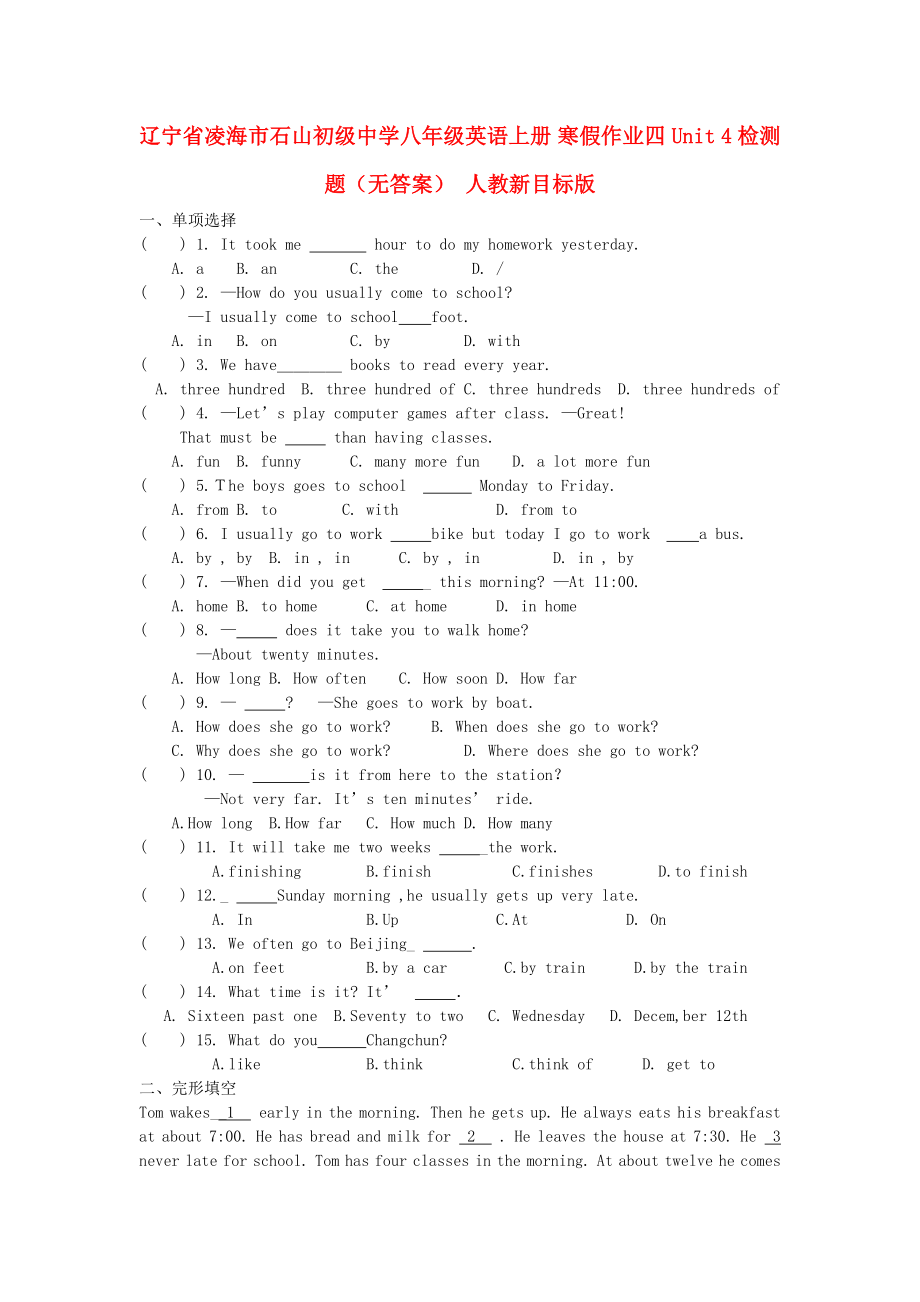《遼寧省凌海市石山初級(jí)中學(xué)八年級(jí)英語(yǔ)上冊(cè) 寒假作業(yè)四 Unit 4 檢測(cè)題(無(wú)答案) 人教新目標(biāo)版》由會(huì)員分享,可在線(xiàn)閱讀�����,更多相關(guān)《遼寧省凌海市石山初級(jí)中學(xué)八年級(jí)英語(yǔ)上冊(cè) 寒假作業(yè)四 Unit 4 檢測(cè)題(無(wú)答案) 人教新目標(biāo)版(2頁(yè)珍藏版)》請(qǐng)?jiān)谘b配圖網(wǎng)上搜索�。
1、遼寧省凌海市石山初級(jí)中學(xué)八年級(jí)英語(yǔ)上冊(cè) 寒假作業(yè)四 Unit 4 檢測(cè)題(無(wú)答案) 人教新目標(biāo)版
一���、單項(xiàng)選擇
( ) 1. It took me hour to do my homework yesterday.
A. a B. an C. the D. /
( ) 2. —How do you usually come to school?
—I usually come to school foot.
A. in B. on C. by D. with
( ) 3
2�����、. We have____ books to read every year.
A. three hundred B. three hundred of C. three hundreds D. three hundreds of
( ) 4. —Let’s play computer games after class. —Great!
That must be than having classes.
A. fun B. funny C. many more fun D. a lot more fun
( ) 5.The boys
3��、 goes to school Monday to Friday.
A. from B. to C. with D. from to
( ) 6. I usually go to work bike but today I go to work a bus.
A. by , by B. in , in C. by , in D. in , by
( ) 7. —When did you get _ this morning? —At 11:0
4��、0.
A. home B. to home C. at home D. in home
( ) 8. — does it take you to walk home?
—About twenty minutes.
A. How long B. How often C. How soon D. How far
( ) 9. — ? —She goes to work by boat.
A. How does she go to work? B. When does she go to work?
C. Why
5��、does she go to work? D. Where does she go to work?
( ) 10. — is it from here to the station�����?
—Not very far. It’s ten minutes’ ride.
A.How long B.How far C. How much D. How many
( ) 11. It will take me two weeks _the work.
A.finishing B.finish
6�、 C.finishes D.to finish
( ) 12._ Sunday morning ,he usually gets up very late.
A. In B.Up C.At D. On
( ) 13. We often go to Beijing_ .
A.on feet B.by a car C.by train D.by the train
( ) 14. What
7、 time is it? It’ .
A. Sixteen past one B.Seventy to two C. Wednesday D. Decem,ber 12th
( ) 15. What do you Changchun?
A.like B.think C.think of D. get to
二�����、完形填空
Tom wakes__1 early in the morning. Then he gets up. He always e
8�、ats his breakfast at about 7:00. He has bread and milk for 2 . He leaves the house at 7:30. He 3 never late for school. Tom has four classes in the morning. At about twelve he comes 4 for lunch. In the afternoon he has two classes. After school is 5 he does his homework and plays with
9、 d\other children.In the evening,Tom’s 6 come back from work. They 7 supper together. After supper, Tom 8 newspaper or story-books. 9 he watches TV or listens to the radio. 10 about nine o’clock, he goes to bed.
( ) 1. A. up B. out C. down D. in
( ) 2. A. supper B.lunch C.
10�����、 breackfast D. dinner
( ) 3. A. has B. is C.will D. can
( ) 4. A. school B. ding-room C. restaurant D. home
( ) 5. A. out B. on C.over D. up
( ) 6. A. father B. mother C. parent D. parents
( ) 7. A. have B. take C. make D. get
( ) 8. A. looks B.reads C. sees D. watches
(
11��、 ) 9. A. Sometime B.Somtimes C. Some time D. Some times
( ) 10. A.On B.In C. At D. For
三. 閱讀理解 A
A mother and her young son got into a bus in a small city and sat down. The bus conductor(售票員) came to them for their money. The mother said, “I want
12�、one ticket to Oxford,” and gave her a shilling (=12 pence).
The conductor looked at the small boy for a few seconds and then said to him, “How old are you, young man?”
The mother began speaking, but the conductor stopped her, and the boy said, “I’m four years old at home, and two and a half on bus
13、es and trains.”
The mother took six pence(便士) out of her bag and gave the money to the conductor. The conductor gave her one and a half tickets.
根據(jù)短文,選擇正確答案����。
( ) 6. One day the mother took a bus _____.
A. to a small city B. to get some money C. with her son D. to get a ticket
( ) 7. T
14�����、he mother gave the conductor ______ pence in all(總共) that day.
A. 12 B. 16 C. 10 D. 18
( ) 8. The mother was _____.
A. not honest (誠(chéng)實(shí)) B. honest C. very clever D. not clever
( )9. The conductor asked _____ how old he was.
A. the mother B. the little boy C. the bus driver D. the mother and the son
( ) 10. The boy was ______ years old in fact.
A. four B. two C. two and a half D. six and a half
 遼寧省凌海市石山初級(jí)中學(xué)八年級(jí)英語(yǔ)上冊(cè) 寒假作業(yè)四 Unit 4 檢測(cè)題(無(wú)答案) 人教新目標(biāo)版
遼寧省凌海市石山初級(jí)中學(xué)八年級(jí)英語(yǔ)上冊(cè) 寒假作業(yè)四 Unit 4 檢測(cè)題(無(wú)答案) 人教新目標(biāo)版

